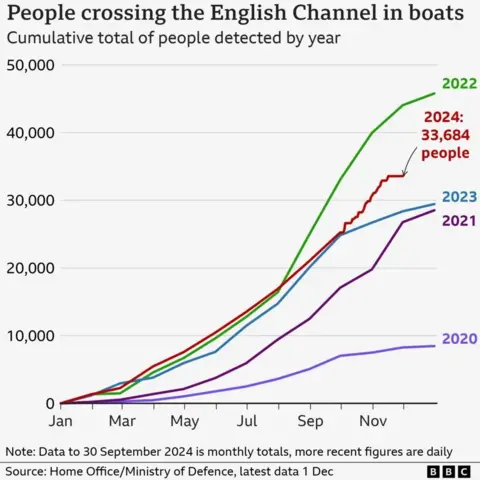Cooper won't set timetable to cut 'dangerous' boat crossings
Home Secretary Yvette Cooper has told the BBC the level of "dangerous" small boat Channel crossings is "far too high" but she refused to set out a timetable to reduce the number.
More than 20,000 people have made the crossing to the UK since Labour took power, up on 17,020 during the same period last year.
During a visit to Rome, Cooper told the BBC's Sunday with Laura Kuenssberg show there had been a "bad history" of home secretaries giving pledges on migration they then failed to keep.
But the Conservatives said Labour's decision to scrap the Tories' Rwanda deportation scheme would prove a "huge mistake".
Also speaking to Kuenssberg, shadow home secretary Chris Philp said his party would seek to put in place a "deterrent-style scheme" if it returned to power.
The number of migrants crossing the Channel in Labour's first five months in office is down on the same period in 2022, a record year for arrivals, but similar to the number who crossed in that period in 2021.
Cooper said the number of crossings was still "deeply damaging" and "dangerous", and was undermining border security as well as putting lives at risk.
"Of course we want to continue to progress, of course we want to see the boat crossings come down as rapidly as possible.
"What we are not going to do is deal with this by slogans. Rishi Sunak said he'd stop the boats in a year."
Asked whether the government's reluctance to set public targets on reducing the number of small boat crossings shows it was not a priority, Cooper said: "Quite the opposite.
"We've made clear that border security is actually one of the foundational issues".

Labour has put action against people-smuggling gangs, as well as broader law enforcement efforts, at the heart of its strategy to reduce boat crossings.
On Sunday, the Home Office published new figures showing a total of 13,460 foreign nationals had been returned to their home countries through both forced and voluntary departures since Labour came to office in July.
The department said the number of enforced returns was up compared to the same period last year, arguing greater collaboration with other countries had made more return flights possible.
Philp argued the uptick in returns was the continuation of a "trend" which had started before this year's election.
Labour has also previously expressed an interest in studying Italy's deal with Albania, under which some migrants rescued by the Italian coastguard will be sent there to have their asylum claims processed.
That five-year agreement has faced significant challenges, with transfers recently halted by a court in Rome.
Asked whether Labour would also consider processing asylum claims offshore, Cooper said the government would "look at whatever works" but emphasised that any such scheme would need to be "effective".
She also blamed an increase in hotel places for asylum seekers since the election on a "collapse in decision-making" ahead of the vote, which she argued had left Labour with a "soaring backlog" of cases on entering office.
Speaking on Sky News, Home Office minister Angela Eagle defended the lack of an official timetable for reducing crossings, adding that the public wanted to see "steady progress" rather than a "date snatched out of the air".
But Philp told the BBC Australia's offshore processing policies had shown that "deterrent works" - and pledged the Tories would aim to resurrect a Rwanda-style deal if they returned to power.
It was "telling", he argued, that reducing Channel crossings had not featured in the six government "milestones" laid out by Sir Keir Starmer last week.
The Conservatives under Kemi Badenoch have also separately committed to setting a cap on annual legal migration into the UK.
Asked where the cap would be set, Philp did not offer details beyond saying it would be "far, far lower" than the 350,000 predicted for future years by official economic forecasters.
The government announced on Sunday that £8m will be ring-fenced for new technology to fight smuggling gangs, including body-worn cameras and fingerprinting kits to "ramp up immigration enforcement operations".
The new technology will support operational teams as they build cases "against those working illegally in the UK or unscrupulous businesses employing them".
Biometric fingerprinting kits are set to be given to those on the frontline, which the government says will enable immigration enforcement officers to cross-check detained individuals against police databases "on the spot".
The home secretary also suggested she hoped to fast-track claims from those seeking asylum from countries deemed safe.
Cooper said that despite the lack of a specific "milestone" target on small boat crossings, border security remained a "clear priority for the government".
Earlier this week, Germany and the UK agreed on a deal to tighten Berlin's law to make it easier to prosecute those helping to smuggle people into the UK.
Under the new agreement, the Home Office says Germany has pledged to make the activity a clear criminal offence.
Sunday with Laura Kuenssberg airs on BBC One at 09:00 GMT on Sunday 15 December
